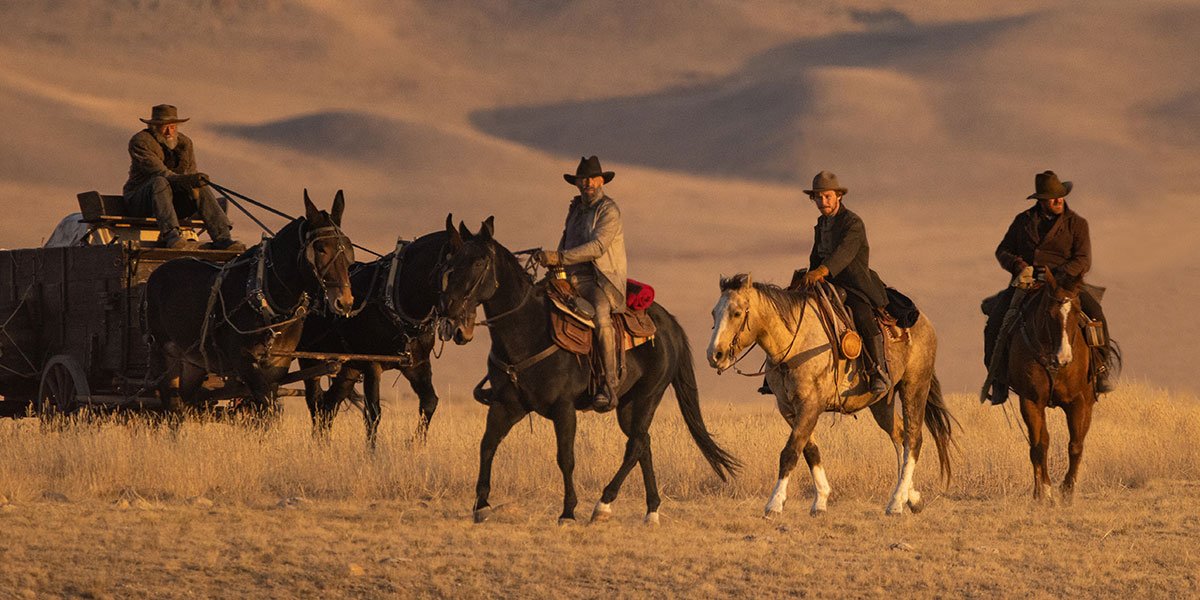[TIFF 2022] REVIEW: 'Butcher's Crossing' leaves meat on the bone
Nicolas Cage in Butcher’s Crossing, directed by Gabe Polsky
People love to predict the end of the Marvel Cinematic Universe, comparing it to the death of the craze for Westerns in the 1970s and 80s. Surely, goes the argument, the taste for superheroes will dry up like a gunslinger lost in the desert. Whether or not Marvel’s time in the spotlight does end in the coming years, it’s not true to say that Westerns are completely gone. Every year, a handful of new ones come out. Most are bad, with low-budget productions taking advantage of how easy it is to throw some actors into 19th-century clothing and to put some antique guns in their hands. Like any genre, a few turn out good or even great. Recent examples of fantastic Westerns include The Assassination of Jesse James by the Coward Robert Ford, The Salvation, and The Sisters Brothers.
Most new Westerns, though, don’t have a lot of new things to say. Much of the variety between them comes down to whichever style the director brings to the familiar tropes: silent outlaws, gunfights in empty streets, riders chasing each other across vast landscapes. The latest new Western up for consideration is Butcher’s Crossing, directed by Gabe Polsky and featuring none other than Nicolas Cage. Where does it rank within the small stream of movies from this genre that continue to arrive, long after their heyday?
Butcher’s Crossing has a few firsts: it’s the first solo fictional feature directed by Polsky - who’s mostly known as a documentary filmmaker - but more importantly, it’s the first time Cage has made a Western. Sadly, there aren’t a lot of Cage-ified shootouts to be found here. It’s the story of a young man named Will (Fred Hechinger) who leaves Harvard in 1874 to experience the Wild West. He’s not sure what he’s looking for in the untamed lands of Montana; his journey ends up feeling more like 19th-century adventure tourism than a heartfelt quest.
Will agrees to finance a buffalo hunt led by Miller (Cage), a veteran hunter who wants to finally nab his great white whale - or rather, a big brown herd. Dismayed by the quality of the over-hunted buffalo near human settlements, Miller wants to venture into the mountains to locate a secluded valley with a healthy herd 10,000 strong. And while the hunting party’s initial efforts are successful, it’s not long before the weather shifts and the tensions begin to rise. Will becomes increasingly disillusioned with his new life, all while Miller only seems to get more interested in massacring buffalo.
Polsky’s film makes the mistake of not understanding how to use an actor like Cage. He’s either your expressionist, bombastic star, or he works in an ensemble of equally strong (yet obviously different) castmates. Here, Cage - sporting a thick beard and a bald head that he shaves with a straight razor - is frequently absent due to his quasi-supporting role. The main character is meant to be Will, but as an everyman type who’s steadily losing his mind, he doesn’t command any attention. Even when Miller gets close to a true Cage explosion late in the film, Polsky cuts around the performance, putting most of the dialogue in voiceover, robbing us of the character at his most extreme point.
The editing really is one of the sore spots throughout Butcher’s Crossing. The sometimes surreal, chaotic style may work for some, but I frequently found myself confused by what Polsky and his editor Nick Pezzillo were trying to show us. Some sequences felt oddly truncated, or put together in a way that suggested that they didn’t have the coverage they needed to get the edit quite right. When Polsky mentioned at the screening that the shoot was painfully short (19 days), I wondered whether they found themselves struggling to assemble the story they wanted to tell.
The film wants to be a message movie about the tragedy of the buffalo industry and the near-extinction of the species. So it spends a lot of time showing Miller’s vendetta against the animals, the origin of which is hinted at only briefly when Miller mutters something about a near-death experience in the past. But that means the filmmakers aren’t very interested in what Will learns from his harrowing experience during the hunt. Will witnesses the bloodbath caused by Miller, survives a brutal winter, and then sees how fickle the market is for animal products like furs. Will thus loses his childlike wonder about the West, and that’s about all the movie has to say.
Much like the depleted herds that drive Miller into the mountains, there are slim pickings to be had in Butcher’s Crossing. There’s simply not enough story here - plot, character drama, or action - to make the effort worthwhile. If you’re a Cage and a Western fan, you might be interested to see what the actor does in this genre. Other than that, I’d suggest waiting until something more substantial comes into your sights.
Butcher’s Crossing gets two stars out of four.
Stray thoughts
The movie gets some points for working with the Blackfeet Nation Indigenous community to spread awareness about buffalo conservation, but I’m not sure it makes the movie better.
It’s a little hard to believe that Miller could kill 3,000 buffalo on his own with a couple of rifles, even once the Cage rage kicks in.


